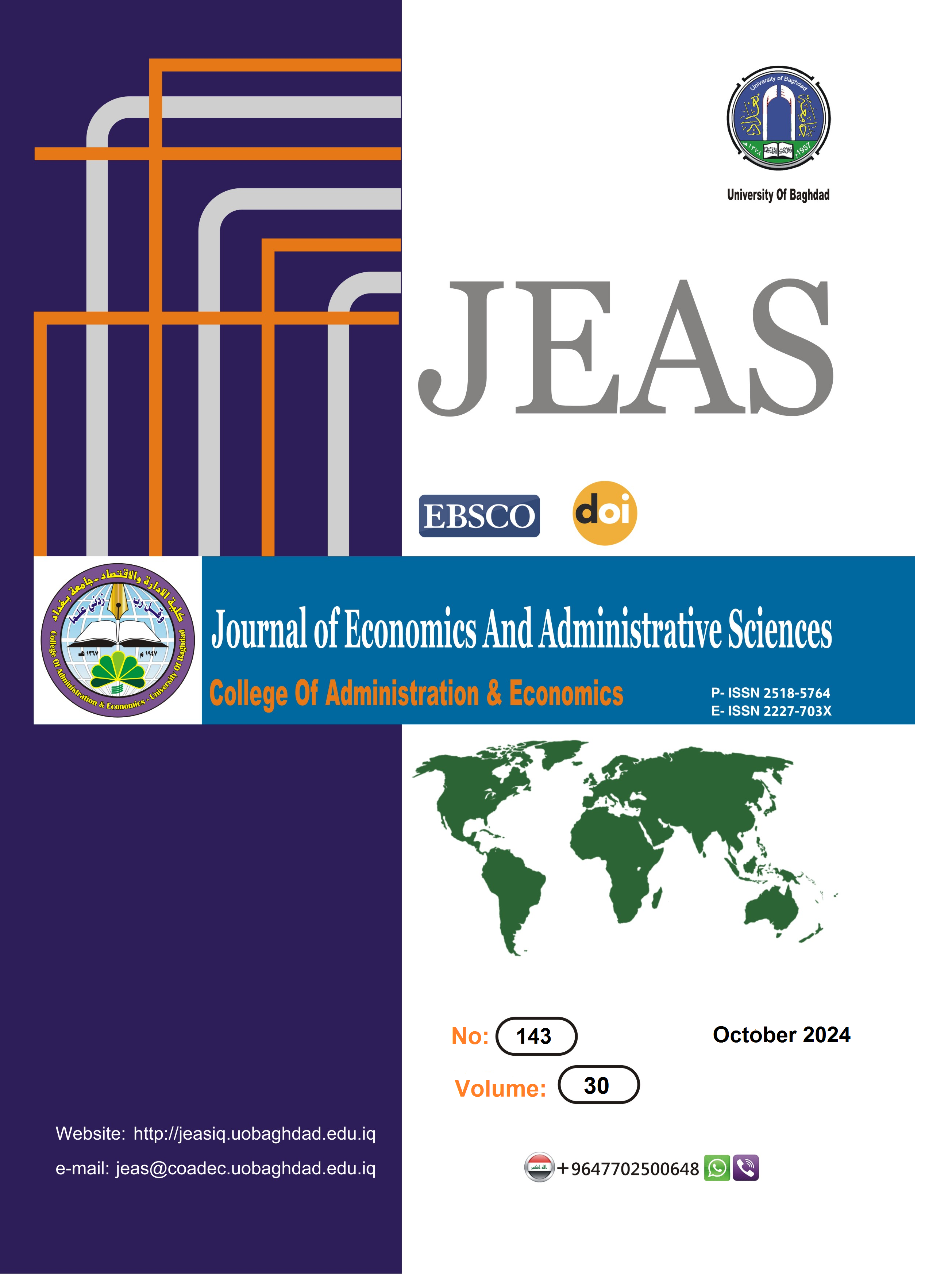The Impact Of Customer Empowerment On Reducing Marketing Deception: A Field Study For Several Iraqi Contracting Companies
DOI:
https://doi.org/10.33095/htprmp90Keywords:
Fraud, customer empowerment, marketing deceptionAbstract
Purpose: This paper attempts to analyze and discuss the impact of Customer Empowerment (CE) in reducing marketing deceptive practices carried out by companies.
Theoretical framework: The literature related to the research topic did not describe of the application of CE in the workplace, as it is a recent variable and is still in the development stage. The scale (Abdel-Bari & Ashry, 2023) was adopted to measure the CE questionnaire, in addition to the scale (Gaber et al., 2018) to measure Marketing Deception (MD).
Methodology: Field research was used to understand the practice of CE and identify scams. Six companies specialized in the field of contracting were selected. The research sample consisted of (152) employees. A questionnaire was used to collect data, and hypotheses were tested using the statistical program (SPSS).
Results: There is a positive impact of empowering customers in reducing deceptive marketing practices.
Research, practical and social implications:
Provide a detailed description of the means that can achieve CE and reduce MD. Also, we Provides a practical approach to researching CE and suggests that future research should include business cases as a means of achieving this and provide justification for the importance of implementing CE practices.
Originality/value: This paper is among the few to address CE with MD and emphasizes that CE must be an organization-wide goal and requires a long-term commitment to eliminate MD.
Downloads
References
Abdel-Bari, M., & Ashry, I. (2023). The relationship between direct marketing and customer empowerment (by application to customers of electronic shopping sites in the Arab Republic of Egypt). Egyptian Journal of Business Studies, 47(3), 189–229.
Akhavannasab, S., Dantas, D. C., & Senecal, S. (2018). Consumer empowerment in consumer–firm relationships: conceptual framework and implications for research. AMS Review, 8(3), 214–227.
Aldaihani, F. M. F., & Ali, N. A. Bin. (2018). Impact of social customer relationship management on customer satisfaction through customer empowerment: A study of Islamic Banks in Kuwait. International Research Journal of Finance and Economics, 170(170), 41–53.
Al-Hindawi, M., & Abdul-Rahim, A. I. (2021). The effect of marketing deception on the consumer’s purchase decision - an applied study on students at Dimat University. Scientific Journal of Business and Environmental Studies, 1(12), 295–339.
Al-Jubouri, A. A. N. (2020). The effect of marketing deception on the decision to purchase electronic purchases: an exploratory study for students of the Department of Business Administration - College of Administration and Economics in Iraqi universities. Al-Rafidain Development Magazine, 39(128), 129–149.
Al-Sawy, Z. (2023). Measuring customer interaction during the stages of purchasing decision-making towards marketing deception practices. International Journal of Administrative, Economic and Financial Sciences, 2(4), 81–140.
Bachouche, H., & Sabri-Zaaraoui, O. (2017). Are all customer empowerment strategies equally beneficial? The role of brand familiarity and type of empowerment strategies. 33è Congrès de l’Association Française de Marketing.
BEKOUCHE, K., CHERFAOUI, M., & KORICHI, H. S. (2018). Marketing deception in mobile services: Study of a sample of mobile phone market operators in Ain El-Defla (Algeria). El-Bahith Review, 18(1), 631–643.
Beshibshi, A. H., Haroush, O., & Amara, S. (2018). The effect of marketing deception on building the mental image of consumers in the services market: a field study of our sample of consumers of the services of the telecommunications company Mobilis Agency - Jijel -.
Botti, S., Iyengar, S. S., & McGill, A. L. (2023). Choice freedom. Journal of Consumer Psychology, 33(1), 143–166.
Camacho, N., De Jong, M., & Stremersch, S. (2014). The effect of customer empowerment on adherence to expert advice. International Journal of Research in Marketing, 31(3), 293–308.
Castillo, J. (2017). The relationship between big five personality traits, customer empowerment and customer satisfaction in the retail industry. Journal of Business and Retail Management Research (JBRMR), 11(2).
Dakrouri, M. I., & Awadallah, A. A.-S. A. (2020). Introductions and outcomes of electronic customer empowerment: an applied study on customers of electronic shopping sites. Scientific Journal of Financial and Commercial Studies and Research, 1(2), 447–475.
Karim, D., & Shirov, F. (2021). The impact of marketing deception on the consumer’s purchasing decision.
Docan-Morgan, T. (2019). The Palgrave handbook of deceptive communication. Springer.
D’Souza, V. (n.d.). “Unethical Advertising through Social media”-A case study investigating ethical marketing issues in fast food industry of Ireland.
El Beirouti, A., & Mouterfi, A. (2022). Customer empowerment: managerial practice to involve the customer and exploit his knowledge in order to improve his satisfaction-Djezzy Company Case. Les Cahiers Du Cread, 38(1), 31–60.
Gaber, H. R., Labib, A. A., & Salem, K. O. (2018). The effect of marketing deception on consumer buying decision On Facebook. An empirical study on University Students In Libya. European Journal of Business and Innovation Research, 6(3), 12–18.
Gamp, T., & Krähmer, D. (2018). Deception and competition in search markets. University of Bonn and University of Mannheim, Germany.
Helmy, I., Adawiyah, W. R., & Banani, A. (2019). Linking psychological empowerment, knowledge sharing, and employees’ innovative behavior in SMEs. The Journal of Behavioral Science, 14(2), 66–79.
Hu, H., & Krishen, A. S. (2019). When is enough, enough? Investigating product reviews and information overload from a consumer empowerment perspective. Journal of Business Research, 100, 27–37.
Khalifa, M. (2021). The effect of marketing deception on customers’ mental image: An applied study on Egyptian mobile phone service companies. Scientific Journal of Business and Environmental Studies, 1(12), 191–261.
Liu, X., Lin, C., Zhao, G., & Zhao, D. (2019). Research on the effects of entrepreneurial education and entrepreneurial self-efficacy on college students’ entrepreneurial intention. Frontiers in Psychology, 10, 450989.
Prentice, C., Han, X.-Y., & Li, Y.-Q. (2016). Customer empowerment to co-create service designs and delivery: Scale development and validation. Services Marketing Quarterly, 37(1), 36–51.
Rajab, J., & Al-Masry, M. (2019). The role of customer empowerment in developing his value to the company by mediating the quality of the relationship: an applied study on customers of cellular telecommunications companies in Syria. Arab Journal of Management, 39(1), 165–190. https://doi.org/10.21608/aja.2019.27780
Roth, L. (2022). Deception Perception: The Marketing of Student Loans.
Sadiqe, L., & Mohsen, A. (n.d.). THESIS INTRODUCTION FORM.
Song, R., Kim, H., Lee, G. M., & Jang, S. (2019). Does deceptive marketing pay? The evolution of consumer sentiment surrounding a pseudo-product-harm crisis. Journal of Business Ethics, 158, 743–761.
Turnipseed, D. L., & VandeWaa, E. A. (2020). The little engine that could: The impact of psychological empowerment on organizational citizenship behavior. International Journal of Organization Theory & Behavior, 23(4), 281–296.
Wiastuti, R. D., & Susilowardhani, E. M. (2015). Element of Marketing Communication Mix for Hotel with Sharia Concept (Study Case in Sofyan Hotel Betawi). Proceeding of ICCOMAC.
Published
Issue
Section
License
Copyright (c) 2024 Journal of Economics and Administrative Sciences

This work is licensed under a Creative Commons Attribution-NonCommercial-NoDerivatives 4.0 International License.
Articles submitted to the journal should not have been published before in their current or substantially similar form or be under consideration for publication with another journal. Please see JEAS originality guidelines for details. Use this in conjunction with the points below about references, before submission i.e. always attribute clearly using either indented text or quote marks as well as making use of the preferred Harvard style of formatting. Authors submitting articles for publication warrant that the work is not an infringement of any existing copyright and will indemnify the publisher against any breach of such warranty. For ease of dissemination and to ensure proper policing of use, papers and contributions become the legal copyright of the publisher unless otherwise agreed.
The editor may make use of Turnitin software for checking the originality of submissions received.























